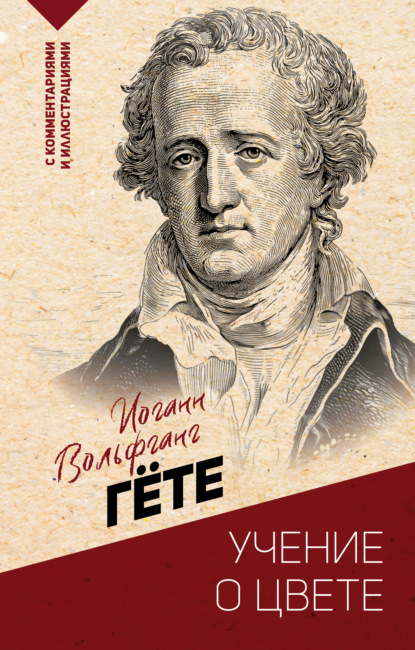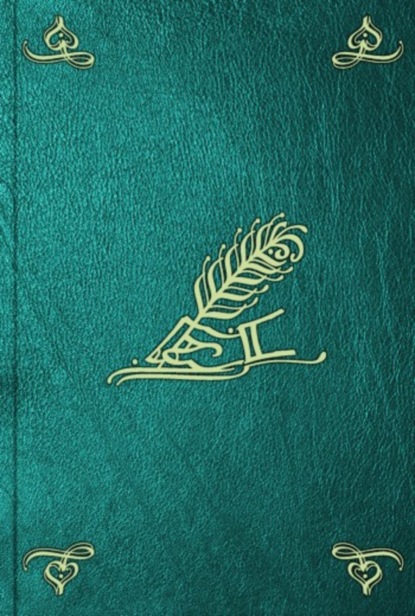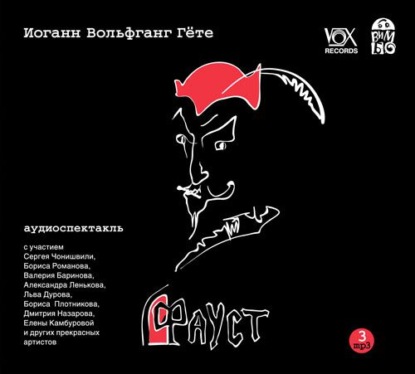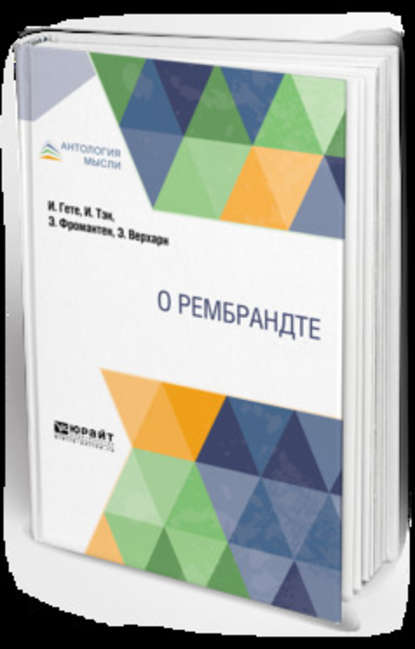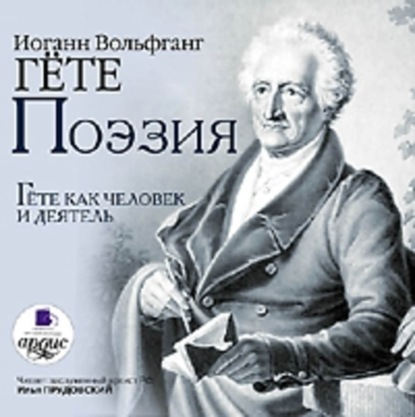 Полная версия
Полная версияПолная версия:
Иоганн Вольфганг Гёте Maxims and Reflections
- + Увеличить шрифт
- - Уменьшить шрифт

Johann Wolfgang von Goethe
Maxims and Reflections
TRANSLATOR'S PREFACE
I
The translation of Goethe's "Prose Maxims" now offered to the public is the first attempt that has yet been made to present the greater part of these incomparable sayings in English. In the complete collection they are over a thousand in number, and not more perhaps than a hundred and fifty have already found their way into our language, whether as contributions to magazines here and in America, or in volumes of miscellaneous extract from Goethe's writings. Some are at times quoted as though they were common literary property. To say that they are important as a whole would be a feeble tribute to a work eloquent for itself, and beyond the need of praise; but so deep is the wisdom of these maxims, so wide their reach, so compact a product are they of Goethe's wonderful genius, that it is something of a reproach to literature to find the most of them left untranslated for the sixty years they have been before the world. From one point of view, the neglect they have suffered is in no way surprising: they are too high and severe to be popular so soon; and when they meet with a wide acceptance as with other great works, much of it will rest upon authority. But even for the deeper side of his writings, Goethe has not been denied a fair measure of popular success. No other author of the last two centuries holds so high a place, or, as an inevitable consequence, has been attacked by so large an army of editors and commentators; and it might well be supposed by now that no corner of his work, and least of all one of the best, had remained almost unnoticed, and to the majority unknown. Many of these maxims were early translated into French, but with little success; and even in Germany it was only so late as the year 1870 that they appeared in a separate form, with the addition of some sort of critical comment and a brief explanation of their origin and history.1
But although to what is called the reading public these maxims are as yet, no less in fact than in metaphor, a closed book, its pages have long been a source of profit and delight to some of those who are best able to estimate their value. What that value is, I shall presently endeavour to explain. No one, I think, can perceive their worth without also discerning how nearly they touch the needs of our own day, and how greatly they may help us in facing certain problems of life and conduct, some of them, in truth, as old as the world itself, which appear to us now with peculiar force and subtlety.
It was in this respect that they were warmly recommended to me some years ago by my excellent friend, Professor Harnack, the historian of Dogma, a writer with a fine and prudent enthusiasm for all ennobling literature. It is to him that I owe the resolve to perform for the maxims, as far as I could, the office of translator; a humble office, but not, as I have good reason to know, without its difficulty, or, as I venture to hope, without its use. Of many of them the language is hardly lucid even to a German, and I have gratefully to acknowledge the assistance I have received from the privilege of discussing them with so distinguished a man of letters.
To Professor Huxley I am also deeply indebted. I owe him much for friendly encouragement, and still more for help of an altogether invaluable kind; for in its measure of knowledge and skill, it is admittedly beyond the power of any other living Englishman. The maxims deal, not alone with Life and Character, where most of them are admirable, but also with certain aspects of Science and Art; and these are matters in which I could exercise no judgment myself, although I understood that, while many of the maxims on Science and Art were attractive, they were not all of great merit. Professor Huxley not only did me the honour to select the maxims on Science, but he was further good enough to assist me with them, and to read and approve the translation as it now stands. The weight and the interest of his authority will thus give additional value to that section of the book, and also do much to overcome the objections that exist to making a selection at all.
For a selection is a necessary evil. It is an evil because, even if it leaves the best, it takes away something of a man's work; if it shows us the heights he has reached, it obliterates the steps of his ascent; it endangers thoughts that may be important but imperfectly understood; and it hinders a fair and complete judgment. But in the end it is a necessity: we are concerned chiefly with the best and clearest results, and it is only the few who care to follow the elaborate details of effort and progress, often painful and obscure. There is no author with whom, for most readers, selection is so necessary as it is with Goethe; and in no other kind of literature is it so amply justified or so clearly desirable as where the aim is to state broad truths of life and conduct and method in a manner admitting of no mistake or uncertainty. When a writer attempts achievements, as Goethe did, in almost every field of thought, it need be no surprise to any one who has heard of human fallibility that in solid results he is not equally successful everywhere. In deciding what shall be omitted, there is no difficulty with maxims which time has shown to be wrong or defective; they have only an historical interest. But great care is necessary with others that are tentative, questionable, or obscure enough to need the light of a commentary, sometimes dubious; where for most of us there is never much profit and always occasion for stumbling. I count it a singular piece of good fortune that the choice of the scientific maxims should be undertaken by so eminent a judge of their practical value, who is also a scholar in the language and a great admirer of Goethe in his other and better known productions. For if a writer of this immense versatility cannot always hope to touch the highest goal, it is well that all his efforts should be weighed in a later day by the best and friendliest knowledge.
The maxims on Art were at first a matter of some little difficulty. It is plain, I think, that they are below the others in value and interest; and in any collection of sayings the less there is of general worth, the more delicate becomes the task of choosing the best. If I omitted them all, the selection would not be duly representative, and it seemed likely that some at least were worthy of being preserved, if only to illustrate Goethe's theories. I therefore sought the best advice; and here again I have to tender my thanks for assistance second to none in skill and authority, – that of Sir Frederick Leighton, kindly given under circumstances which much increase my obligation. For it is my duty to say that Sir Frederick Leighton had no desire, but rather reluctance, to make a selection from maxims on Art which he was often not prepared to endorse, or to regard as in any way commensurate with Goethe's genius; and nevertheless he did me the honour to point out a few which I might insert, as being of interest partly for their own sake, partly also for the name of their author.
The maxims on Science and Art are, however, when taken together, hardly a fifth of this volume. The others I have selected on the simple and I hope blameless principle of omitting only what is clearly unimportant, antiquated, of past or passing interest, of purely personal reference, or of a nature too abstruse to stand without notes of explanation, which I should be sorry to place at the foot of any of these pages. I have also omitted eleven maxims drawn from Hippocrates On Diet; fifteen containing an appreciation of Sterne, together with some twenty more which Goethe himself translated from a curious work wrongly attributed to that writer. It will be convenient if I state that I have thus omitted some hundred and twenty out of the six hundred and fifty-five which make up the section styled in the original Ethisches, which I translate by Life and Character, the section which also contains the maxims on Literature, now collected and placed in a separate section with those on Art. Sir Frederick Leighton chose thirty-five out of a hundred and eighteen on Art, and Professor Huxley seventy-six out of two hundred and eighty on Science.
II
Having thus acknowledged but in no way discharged a triple debt of gratitude, it will be next in order if I briefly state the history of the work which now appears in an English dress, before attempting to speak of its nature and value.
The publication of the maxims belongs to the later, that is to say, the last thirty, years of Goethe's life; and the greater number of them appeared only in the last ten, while some are posthumous.
It is impossible to say with certainty at what period he began the observations which were afterwards to come before the world in this shape; nor is the question of any real interest except to pedantic students of such matters. It is probable that, like most writers, Goethe was in the habit of noting transient thoughts of his own, as well as opinions of others that suggested more than they actually conveyed; and of preserving for further use what he had thus, in his own words, written himself and appropriated from elsewhere —Eigenes and Angeeignetes. The maxims grew out of a collection of this character. It was a habit formed probably in early life, for somewhere in the Lehrjahre– a work of eighteen years' duration, but begun at the age of twenty-seven – he makes Wilhelm Meister speak of the value of it. But there are reasons for thinking that most of the maxims, as they now stand, were not alone published but also composed in his last years. The unity of meaning which stamps them with a common aim; the similarity of the calm, dispassionate language in which they are written; the didactic tone that colours them throughout, combine to show that they are among the last and ripest fruits of his genius. Some were certainly composed between the ages of fifty and sixty; more still between that and seventy; while there is evidence, both internal and external, proving that many and perhaps most of them were his final reflections on life and the world. This it is that adds so much to their interest for as he himself finely says in one of the last of them, "in a tranquil mind thoughts rise up at the close of life hitherto unthinkable; like blessed inward voices alighting in glory on the summits of the past."
But whenever all or any of them were written, and whatever revision they may have undergone, none were published until 1809, when Goethe was sixty years of age. It was then that he brought out Die Wahlverwandschaften. A few of the maxims on Life and Character were there inserted as forming two extracts from a journal often quoted in the earlier part of the story. "About this time," writes Goethe, as he introduces the first of these extracts, "outward events are seldomer noted in Ottilie's diary, whilst maxims and sentences on life in general, and drawn from it, become more frequent. But," he adds, "as most of them can hardly be due to her own reflections, it is likely that some one had given her a book or paper, from which she wrote out anything that pleased her." A few more maxims appeared eight years later in Kunst und Alterthum, a magazine founded by Goethe in 1816 and devoted to the discussion of artistic questions; and a larger number first saw the light in the same publication at various dates until its extinction in 1828. Some of the observations on Science had meanwhile been incorporated with two treatises on branches of that subject.
Eckermann tells a curious story of the way in which Goethe then continued the publication of the maxims. Wilhelm Meisters Wanderjahre had appeared in its first form in 1821. Afterwards, in 1829, Goethe decided to remodel and lengthen it, and to make two volumes out of what had originally been only one. His secretary was employed to copy it out in its revised form. He wrote in a large hand, which gave the impression that the story might well fill even three volumes; and directions to this effect were sent to the publisher. But it was soon discovered that the last two volumes would be very thin, and the publisher asked for more manuscript. Goethe, in some perplexity, sent for Eckermann, and producing two large bundles of unpublished papers, containing, as he said, some very important things, – "opinions on life, literature, science and art, all mingled together," proposed to him to lengthen out the volumes by inserting selections from them. "You might," he suggested, "fill the gaps in the Wanderjahre by making up some six or eight sheets from these detached pieces. Strictly speaking, they have nothing to do with the story; but we may justify the proceeding by the fact that I mention an archive in Makarie's house, in which such miscellanies are preserved. In this way we shall not only get over our difficulty, but find a good vehicle for giving much interesting matter to the world." Eckermann approved the plan, and divided his selection into two parts; and when the new edition of the Wanderjahre appeared, one of them was styled Aus Makariens Archiv, and the other Betrachtungen im Sinne der Wanderer: Kunst, Ethisches, Natur. The remainder of the unpublished maxims appeared posthumously, either in the Nachgelassene Werke in 1833, or in the quarto edition of 1836.
Instructions had been given to Eckermann to collect all the maxims, arrange them under different heads, and include them in appropriate volumes; but he resolved to deviate from his instructions to the extent of publishing them all together; and the alteration is certainly an advantage. A slight re-arrangement was made by von Loeper, who was deterred from undertaking a more radical one, although he thought it might be done with profit, by the consideration that when a literary work of undesigned and fortuitous form has lived any number of years in a certain shape, that fact alone is a weighty argument against any change in it. In a translation, perhaps, where the work is presented anew and to a fresh public, the change might be allowable; and I should have undertaken it, had there not been a more serious reason, which von Loeper also urges, against any attempt at systematic re-arrangement: the further fact, namely, that many of the maxims have a mixed character, placing them above our distinctions of scientific and ethical, and making it difficult to decide under which heading they ought to fall. I have, therefore, generally followed the traditional order; with this exception, that, for obvious reasons, the maxims dealing with Literature are here placed together; and as only a few of those on Art appear in these pages, I have included them in the same section. In one or two cases I have united closely connected maxims which are separated in the original; and, for the sake of a short title, I have slightly narrowed the meaning of the word Spruch, which applies to any kind of shrewd saying, whether it be strictly a maxim or an aphorism. Some little liberties of this kind may, I think, be taken by a translator anxious to put the work before his own public in an orderly and convenient form.
The last section in this book requires a word of explanation. It is a little essay on Nature which is to be found with a variety of other fragments in the last volume of Goethe's collected works. Too short to stand by itself, if it appears at all, it must be in company with kindred matter; and as a series of aphorisms, presenting a poetic view of Nature unsurpassed in its union of beauty and insight, it is no inappropriate appendage to the maxims on Science. It is little known, and it deserves to be widely known. I venture to think that even in Germany the ordinary reader is unaware of its existence. For us in England it was, so to speak, discovered by Professor Huxley, who many years ago gave a translation of it as a proem to a scientific periodical. Perhaps that proem may yet be recovered as good salvage from the waters of oblivion, which sooner or later overwhelm all magazines. Meanwhile I put forward this version.
For sixty years this essay has stood unquestioned in Goethe's works; but doubt has recently been cast on its authorship. The account hitherto given rests upon the excellent ground of Goethe's own declaration. The essay, it appears, was written about the year 1780, and offered to the Duchess Amalia. Some time after her death it was found amongst her papers, and sent to Goethe in May, 1828, when, as he wrote to his friend the Chancellor von Müller, he could not remember having composed it; although he recognised the writing as that of a person of whose services he used to avail himself some forty years previously. That at so great a distance of time a prolific author could not recall the composition of so short a piece is not, indeed, improbable; but Goethe proceeded to say that it agreed very well with the pantheistic ideas which occupied him at the age of thirty, and that his insight then might be called a comparative, which was thus forced to express its strife towards an as yet unattained superlative. Notwithstanding this declaration, the essay is now claimed as the production of a certain Swiss friend of Goethe's, by name Tobler, on external evidence which need not be examined here, and on the internal evidence afforded by the style, which is certainly more pointed and antithetic than is usual with Goethe. But a master of language who attempted every kind of composition may well have attempted this; and even those who credit an otherwise unknown person with the actual writing of the essay candidly admit that it is based upon conversations with Goethe. It is so clearly inspired with his genius that he can hardly be forced to yield the credit of it to another.
III
It is no wish or business of mine to introduce these maxims by adding one more to the innumerable essays, some of them admirable, which have been written on Goethe. I have found the translation of one of his works a harder and certainly a more profitable task than a general discourse on them all; and I profoundly believe that, rather than read what has been written on Goethe, it is very much better to read Goethe himself. It is in this belief that I hope the present translation may help in a small way to increase the direct knowledge of him in this country. But there are some remarks which I may be allowed to make on the nature and use of maxims, and the peculiar value of those of Goethe; so far, at least, as they deal with life and character and with literature. If Professor Huxley could be induced to publish the comments which he made to me as I read him the scientific maxims, besides being the best of introductions to that section of the book, they would form a keen and clear review of Goethe's scientific achievements, and an emphatic testimony to his wonderful anticipations of later theories.
Between a maxim, an aphorism, and an apophthegm, and in a more obvious degree, between these and an adage and a proverb, the etymologist and the lexicographer may easily find a distinction. But they are, one and all, fragments of the wisdom of life, treasured up in short, pithy sentences that state or define some general truth of experience; and perhaps with an adage and a maxim, enjoin its practice as a matter of conduct. In the literature of every age there have been writers who, instead of following a less severe method, thus briefly record the lessons taught them by a wide view of the doings of men; from the dim, far-off beginnings of Ptah Hotep the Egyptian to the authors of the Proverbs of Solomon and the Book of Wisdom, from Theognis and Plutarch downwards to our own time. They give us the shrewdest of their thoughts, detached from the facts which gave them birth. But the professed writers of maxims are not the only or always the best authors of them. There is no great writer who is not rich in wise sentences; where we have the advantage of seeing for ourselves the train of thought that induced and the occasion that called them forth. Terse and pregnant sayings are scattered innumerably through the pages of the finest poets, the great orators, philosophers, and historians, wherever they touch the highest level of truth and insight; be it in the lofty interpretation of life, the defence of action or policy, the analysis of character and conduct, or the record of progress; and then it is that large ideas and wide observations take on imperceptibly the nature of maxim or aphorism, illumining, like points of light, whole fields of thought and experience. And the test of their value is that they lose little or nothing by being deprived of their particular context and presented as truths of general import. A collection of proverbs, shrewd sayings, and pointed expressions, taken from the whole range of Greek and Latin literature, was made by the industry of Erasmus in his great folio of Adagia; and perhaps some future student, as diligent as he, may gather up the aphoristic wisdom in the writings of modern times. Goethe himself has in all his great works a wealth of aphorism unsurpassed by any other writer whatever, even though it be Montaigne or Bacon or Shakespeare; and sayings of his not to be found in this collection are some of the best that he uttered.
The besetting sin of the maxim-writer is to exaggerate one side of a matter by neglecting another; to secure point and emphasis of style, by limiting the range of thought; and hence it is that most maxims present but a portion of truth and cannot be received unqualified. They must often be brought back to the test of life itself, and confronted and compared with other sides of the experience they profess to embody. And when a maxim stands this trial and proves its worth, it is not every one to whom it is of value. To some it may be a positive evil. It makes the strongest appeal to those who never see more than one aspect of anything, hardening their hearts and blunting their minds; and even to those who could make a good use of it, there are times when it may mislead and be dangerous. Maxims in their application seem to need something of the physician's art: they must be handled with care, and applied with discretion. Like powerful drugs they may act with beneficent effect on a hardy constitution; they may brace it to effort, or calm the fever of a misguided activity; but great is the mischief they work where the mind is weak or disorganised. As a medicine may save a man at one time that would kill him at another, so the wise counsel of to-day may easily become the poisonous suggestion of to-morrow.
With writers who depend for effect on mere qualities of style and ignore the weightier matters of depth and truth of observation, Goethe has nothing in common; nor with those who vainly imagine that insight is a kind of art, with a method that may be learned and applied. By constant practice a man of literary talent may, it is true, attain a fair mastery of language terse and attractive, and then set himself, if he will, to the deliberate creation of aphoristic wisdom or a philosophy of proverbs; mistaking the dexterous handling of a commonplace for the true process of discovery. The popular literature of the last generation supplies a terrible instance of the length to which the manufacture of maxims can thus be carried, for a time with immense success; and we have seen how a few years suffice to carry them and their author to obscurity. How different is the true process! The maxim that increases knowledge and enriches literature is of slow and rare appearance; it springs from a fine faculty of observation which is in no one's arbitrament, and only less rare than the gift of utterance which adds charm to a thought that itself strikes home with the power of impregnable truth. No amount or intensity of effort will alone produce it; but to the mind of genius it comes like a sudden revelation, flashing its light on a long course of patient attention. "What we call Discovery," says Goethe, "is the serious exercise and activity of an original feeling for truth. It is a synthesis of world and mind, giving the most blessed assurance of the eternal harmony of things."
It is, then, depth and truth and sanity of observation which chiefly mark these sayings of Goethe. It is no concern of his to dazzle the mind by the brilliance of his wit; nor does he labour to say things because they are striking, but only because they are true. He is always in contact with realities, always aiming at truth; and he takes a kindly and a generous view of the world. He has none of the despair that depresses, none of the malice that destroys. There are writers who profess to honour a lofty ideal by a cynical disparagement of everything that falls short of it; who unveil the selfish recesses of the heart as a mistaken stimulus to its virtues; who pay their tribute to great work by belittling human endeavour. Goethe shows us a more excellent way. Touched with a profound feeling of the worth of life, the wisdom of order, the nobility of effort, he gives us an ideal to pursue and shows us the means of pursuing it. Out of the fulness of a large experience, unique in the history of literature, he unfolds the scheme of a practicable perfection, and enforces the lessons he has learned from the steady, passionless, and undaunted observation of human affairs.
